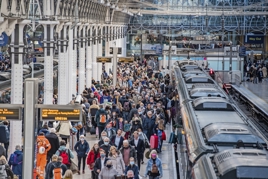On February 20, ministers put forward a draft bill for the future of the railways for pre-legislative scrutiny. Subject to approval by each House of Parliament and it receiving Royal Assent, it would create the biggest rail reform programme in a generation, to become the Rail Reform Act 2024.
The 32-page document sets out a transfer of franchising powers from the Secretary of State to the new Integrated Rail Body (IRB).
This will place the new IRB at arm’s length – though still within reach – of Government. The Bill states that, ‘The Secretary of State may from time to time give to the IRB directions or guidance about the manner in which it is to exercise its functions.’
The Department for Transport (DfT) plans to designate Network Rail Infrastructure Ltd as the IRB. Meanwhile, the Secretary of State is to be given sole power to grant a network licence to the IRB.
The draft Bill aims to facilitate the roll-out of Great British Railways (GBR) which plans to unite responsibility for rail infrastructure and services.
Network Rail chief executive Andrew Haines, who is leading the Great British Railways Transition Team, said: “Passengers, freight customers and communities are crying out for a simpler, better railway and the publication of the draft Bill is an important step on that journey.
“Bringing track and train together under a guiding mind is by far the best way to improve the service the railway offers, unlock the economic potential of a growing network and reduce the burden on the taxpayer.”
GBR will become the new franchising authority, contracting with the private sector to deliver passenger services. GBR will also be tasked with driving forward the UK's rail freight sector, where the Government recently set an ambitious target of 75% growth by 2050.
Commenting on the news, Rail Freight Group Director General, Maggie Simpson OBE said that the Government setting out how the new body will be required to ‘make provisions for the carriage of goods by rail' will create confidence in the new rail structure and encourage private sector investment.
The Bill states that the IRB must prepare an annual report setting out what it has done during each financial year to increase the involvement of businesses in the private sector in the provision of railway services.
However, the Bill applies mainly to Great Britain, as Scottish and Welsh ministers will continue to exercise existing devolved responsibilities.
The DfT says that an option to delegate contracting authority to GBR is available if the devolved administrations wished to integrate track and train.
Darren Caplan, Chief Executive of the Railway Industry Association welcomed progression of the bill, though urged that the Government, “accelerate the legislative process without delay”, adding, “The faster the Government pushes on with rail reform the faster we can remove uncertainty and get on with building a vibrant and world-class railway for the future.”
Similar comments were echoed by Logistics UK’s senior policy advisor Ellis Shelton, who has been pressing government for a ‘whole system’ approach. He said, "it is now of vital importance that the proposals outlined in the Bill are added to the statute as soon as possible after the general election to give rail users the certainty they require for future planning to be effective."
The draft Bill will now undergo pre-legislative scrutiny led by the Transport Select Committee to provide Parliamentarians and industry experts the opportunity to review and provide feedback on the legislation.
Image: Commuters at London Paddington station on February 11, 2021. JACK BOSKETT
















Login to comment
Comments
Wallace Hall - 21/02/2024 18:07
"However, the Bill applies mainly to Great Britain, as Scottish and Welsh ministers will continue to exercise existing devolved responsibilities." Should this say "mainly to England"?